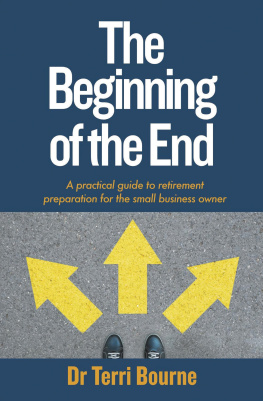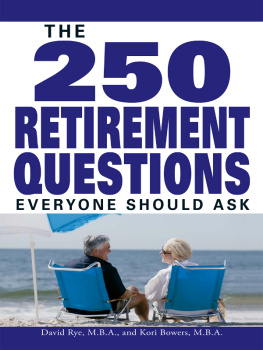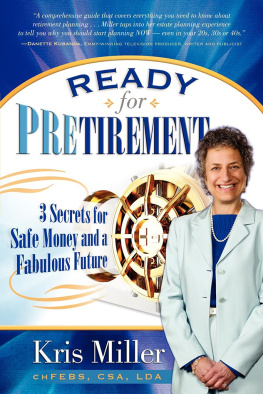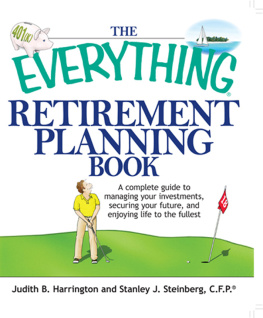All rights reserved.
To Ginny and Lynne and our wonderful families.
100 percent of the profits from this book will be donated to charity.
I
Whats the Problem?
It is better to live rich than to die rich.
Samuel Johnson
Why this book? We both had satisfying careers working alongside accomplished professionals, officials, executives, and entrepreneurs, and were fortunate today to be enjoying happy, fulfilling retirements. Four years ago, we were comparing experiences and discovered how many friends, acquaintances, and former colleagues were unhappy in their retirements. As we shared observations and anecdotes, we were surprised at the problems many of them experienced. They didnt seem to be financial problems; instead, it appeared that their unhappiness stemmed from other issues.
We explored further and discovered that while they had all done the financial planning for a materially secure retirement, they had paid scant, if any, attention to the major life changes that come with retirement. Intrigued by this, we listened to and talked with dozens of retirees about their experiences moving from their careers into the terra incognita of retirement. They all agreed financial planning was a prerequisite but also agreedmany emphaticallythat realizing a successful retirement requires equal if not more attention to nonfinancial issues.
As we reflected on what wed learned, two messages came through loud and clear:
- First, retirement has changed enormously in the last few decades in its duration, the circumstances giving rise to it, and decisions the individual has to make.
- Second, most of those we spoke to were unprepared for the profound personal and life changes retirement brings. Addressing these nonfinancial issues seemed to hold the key to a satisfying and fulfilling retirement, but only financial matters had gotten the necessary attention.
We were curious about what was going on, and we both agreed we wanted to try to help. And then Ted said, You know, we ought to write a book. So we did.
Weve put together this concise and, we hope, practical guide for the individual approaching retirement or perhaps for the recent retiree now confronting the challenges we describe. We hope to help you by framing the important questions and pointing you in helpful directions. Clearly, our perspective is shaped by the scope of our careers, our retired lives, and, importantly, by our age and gender. Well readily acknowledge that, try as we might, we cant fully appreciate how different a womans experience may be nor how someone twenty years younger than us may see their choices and the challenges. We certainly dont present ourselves as authorities. Indeed, you are the authority for creating your retirement.
Now lets get to work.
For too many people approaching retirement, only financial planning has gotten the necessary attention. Whether theyve overlooked, ignored, or avoided the nonfinancial challenges, they risk being unprepared for the profound personal and life changes that retirement brings. A few real - life examples make the point:
- A financial - services executive had been retired for a year. She had done little preparation other than financial planning and was repeatedly waking in the middle of the night worrying, What am I going to do? What can I do? This is a disaster! Maybe I should go back to work.
- A public employee said, My best friends for years have been the people I worked with every day. Once I retired, I found we didnt have much to talk about beyond business. After several lunches without the business issues to talk about, we drifted apart.
- An attorney was consumed by his career and had no other interests, hobbies, or plans. He fought his firms mandatory retirement policy right up to his last day at the office.
- At a cocktail party, a recently retired hospital CEO complained ceaselessly about his first six months in retirement . He was bored. He had nothing to do. His complaints went on and on.
- A corporate executive whod retired at sixty - five planned on spending his days playing golf and poker with the guys at the country club. At age seventy, he developed several physical problems that inhibited his golf game. He could still play but knew his game was deteriorating, and he was no longer competitive with his friends. He decided to give up the game.
How does this happen? People approaching retirement tend to get their financial planning done for several reasons: the benefits are obvious, so much help is readily available, and the wealth - management industry spends tens of millions on advertising. As well, hundreds of books, workshops, and seminars are available. Why havent these same smart, successful people paid serious attention to the nonfinancial dimensions of retirement?
Perhaps because most approaching retirement have practically no real - world experience with what people actually do after they retire, not to mention how their lives change. Their parents retirement experience is outdated for several reasons well explore. They know little about how retirees actually live day - to - day or what issues they face other than the general fact of aging. They dont have much to go on.
As they approach retirement, they may still be so consumed by their job that they have little time or energy to really think about it. Often their most intense, demanding work years are the three to five years leading up to retirement, which leaves little time, space, or energy to contemplate retirements realities.
According to one prominent wealth manager and seconded by an experienced psychotherapist, denial is a more likely explanation. Denial is that unconscious psychological defense mechanism people have for avoiding a problem or issue. Why would otherwise thoughtful, prudent individuals not address these important nonfinancial issues? Because paying attention to fears, feelings, and relationships can be uncomfortable. And planning what is truly the next chapter of your life without a roadmap can seem daunting. Coming to grips with the specifics of retired life and the uncertainties of growing older is challenging and can be stressful and even a bit scary. Bottom line: many otherwise prudent and capable individuals avoid coming to grips with the nonfinancial issues altogether.
Despite all these factors, we were surprised by how eager people were to talk about the problems theyd experienced and the insights theyd gained. We concluded that, for complex reasons, people rationalize not addressing those nonfinancial issues but recognize they should . Further, they encouraged us to take on the challenge of writing this book. One said, Its really important youre doing that. That stuff is every bit as important as the money side, maybe more so. Another said, Wow, what you guys are doing is really, really needed. I want copies to give to some friends and relatives as soon as its printed.
That framed the question: what would be the most effective way to help people approaching retirement deal with these important nonfinancial decisions? The effort involved in doing a good job is not a trivial task. Theyll need to examine their habits and behaviors and think deeply about personal values, relationships, and life goals.









